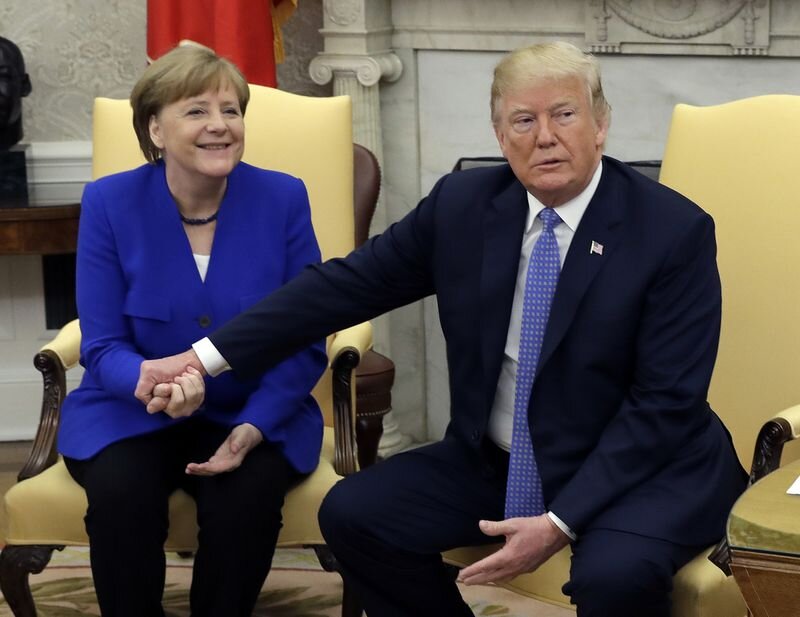Trump heading for clash with Merkel as U.S. makes formal call to form coalition against Iran: report

TEHRAN – U.S. President Donald Trump is heading for a clash with German Chancellor Angela Merkel after the U.S. made a formal call for Germany to join the UK and France to counter what Washington calls Tehran’s threats, according to express.co.uk.
Germany has so far insisted it would not help the UK in its conflict with Iran after the British-flagged Stenna Imperno was seized by Iranian marine on July 19.
Berlin has been left furious with the UK wanting the United States to be involved in any mission as it was Washington that withdrew from the nuclear deal signed in 2015, aimed at limiting Iran’s nuclear program in exchange for termination of sanctions.
But a spokeswoman for the U.S. Embassy in Berlin said: “We have formally asked Germany to help along with France and the UK to secure the Strait of Hormuz and to fight [Iran].”
On Monday, British Foreign Secretary Dominic Raab said he wants to see a European-led approach in terms of support from other nations in the campaign against Iran, but insisted it would also be important to have support from the U.S. to make it “viable and effective”.
The foreign secretary added this should “not be a geopolitical dispute between the EU and the U.S.”
But Britain’s stance has left Germany fuming, and warned involving the U.S. could trigger an “enormous escalation risk”.
German newspaper Suddeutsche Zeitung has reported Britain suggested in a news conference Washington want a leading role in the country’s planned Operation Sentinel.
The military mission was announced by the U.S. earlier this month in immediate response to attacks on tankers in the Gulf of Oman, for which Washington has blamed Iran’s Revolutionary Guards.
Nils Schmid, who serves on the Committee of Foreign Affairs where he is the Social Democratic Party (SPD) parliamentary group’s spokesperson, told radio station Bayerischer Rundfunk: “As Europeans, we have attached great importance to setting ourselves apart from the military confrontational logic of the Americans in the region and to focusing on diplomacy.
“That’s why any European mission only makes sense if it keeps that distance to the very robust U.S. action.”
He warned the British government wants to “go the American way, which is full of dangers,” adding the more military present in the Persian Gulf, the greater the risk of errors being made.
Schmid said: “A shot can then trigger a big conflict. And then you are at the side of the U.S. in a war against Iran, and nobody wants that.”
Rolf Mutzenich, acting parliamentary leader of the SPD, told Suddeutsche Zeitung involving the U.S. in any military mission could create an “enormous escalation risk”.
He warned: “After the takeover by Boris Johnson, it remains to be seen whether the announced initiatives by the old government are still resilient.
“Britain is now returning to a robust American-flagged military mission.”
Mutzenich insisted Germany will “do everything for a diplomatic solution” as part of its current membership in the UN Security Council.
But in a further warning, he said: “I advise those who are now hastily committed to taking certain steps not to disturb the de-escalation talks.”
The Greens in Germany also warned of the increasing dangers of involving the U.S. in a military mission could trigger. Alliance 90/The Greens, often simply Greens, is a green political party in Germany that was formed in 1993 from the merger of the German Green Party and Alliance 90.
The party’s leader Annalena Baerbock told the radio station Berlin-Brandenburg the Europeans would have to make use of all diplomatic tools available to them.
She said: “That means, first and foremost, the promises you have made to Iran - that you will continue to trade with Iran after the sanctions have been imposed by Washington - you have to adhere to it now so it does not escalate.”
Jurgen Trittin, a member of the Foreign Affairs Committee of the Bundestag, insisted an international mandate, for example from the United Nations, would be needed for a German military mission in the Strait of Hormuz.
But the Union Group Vice Chairman Thorsten Frei has not completely ruled out another special session of Parliament during the current summer break for possible German participation in a European mission in the Persian Gulf.
He told the Rheinische Post and the General-Anzeiger: “The Federal Parliament always decides on foreign deployments of the Bundeswehr.
“In case of emergency this happens during a special session during the parliamentary summer break.”
SP/PA
